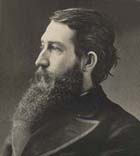A Ballad Of The Trees And The Master Poem by Sidney Lanier
A Ballad Of The Trees And The Master
Into the woods my Master went,
Clean forspent, forspent.
Into the woods my Master came,
Forspent with love and shame.
But the olives they were not blind to Him,
The little gray leaves were kind to Him:
The thorn-tree had a mind to Him
When into the woods He came.
Out of the woods my Master went,
And He was well content.
Out of the woods my Master came,
Content with death and shame.
When Death and Shame would woo Him last,
From under the trees they drew Him last:
'Twas on a tree they slew Him - last
When out of the woods He came.
I see a Biblical imagery in this very unique poem about Salvation-Christ. Do you see this too? Lecie :)
I believe that was Lanier's intention. He was connecting the Garden of Gethsemane imagery with both the Garden of Eden and Jesus's death. Lanier was also pointing out the irony in the Lord of nature dying, on one of his own trees, at the hands of people he had made.
Dear Lecie: There certainly is a biblical aspect to this poem of Lanier's. As a matter of fact, it was made into a hymn and can be found, I believe, in the 1940 Hymnal of the Episcopal Church (PECUSA, not ECUSA) . It is a beautiful expression of Christ's sacrifice and final victory for us. Jerry (*___~)
may I know what is the message and meaning of this poem a ballad of trees and the master
Lanier very rarely wrote this well. When he did, the results were spell-binding: this poem, " The Marshes of Glynn, " and " The Revenge of Hamish."
That was a really strong poem that really flowed well together. Great poem!
This poem has not been translated into any other language yet.
I would like to translate this poem
I have these words which I believe also belong to this poem. Is this correct? It would have to be the beginning of the poem. 'Mary walked among the birch trees questioning each one. 'Little birch trees, little white souls, Have you seen my son? ' None made answer, none knew of him......
No, this is the entirety of the poem.